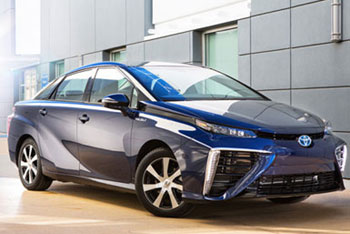Next month marks the start of a new era as Toyota begins sales of the world’s first mass produced hydrogen fuel-cell car.
Mirai goes on sale in Japan this year, and in Europe and the US (east and west coasts) toward the end of 2015. Toyota’s goal is to sell 700 cars next year, 3000 by the end of 2017, and "tens of thousands" within 10 years. It has 200 pre-orders from government agencies and corporations.
"We are at a turning point in the automotive industry," says CEO Akio Toyoda. When we introduced the first hybrid car in the world (the Prius), people said we couldn’t break through, and now we will do it again."
Indeed, while Prius means "to go before," Mirai means "the future" in Japanese. The Prius "paved the way by demonstrating the future of mobility would include electric motors."

"After surviving millions of miles on the test track and 10 years of testing on public roads, in freezing cold and scorching heat, after passing extensive crash tests and after working with local governments and researchers around the world to help make sure it is easy and convenient to refuel, we are ready to deliver," he says. They also cut the cost 95% over 20 years of R&D.
Mirai, with two hydrogen tanks under the seats, has a range of 400-435 miles, and can accelerate from 0-60 miles per hour in 9 seconds. A powertrain with an electric motor and fuel cell stack replaces the gasoline engine.
In the US, it will retail at $57,500, ending up around $45,000 after federal and state incentives. Filling up will cost more than gas at first but will cheaper in the long run, Toyota says, and California will provide it free to Mirai owners.
Where the Hydrogen Stations Are
"It was a big challenge when we first introduced the Prius in 1997 and it’s an even bigger challenge this time because there is no infrastructure," notes Yoshikazu Tanaka, deputy chief engineer for Toyota’s next generation vehicle development.
Imagine launching a completely new car where there’s hardly any place to fill up! There are two commercial fuel stations in Japan, and 43 under construction, according to the Ministry of Economy, Trade and Industry, with plans for 100 by the end of 2016 – subsidized partially by the government.
Germany also plans to have 100 stations by 2017, and in the US, Hydrogen Highways are being built in California (60 stations by 2016) and in the Northeast (12 stations).
Toyota says it’s not the number of stations that are important, however, but where they are located. California, for example, would do just fine with 15% of its gas stations.
Mike Chino, writing for Inhabitat, describes the Mirai this way:
"The Toyota Mirai drove like a dream – it floats along the road and the ride is virtually silent save for the sci-fi sound of the hydrogen pump and the whirr of the electric drivetrain. The car’s electric motors give it plenty of torque and a sprightly pickup, and the vehicle’s touch-sensitive controls are a pleasure to use. A counter on the dashboard displays how many miles you can drive until it’s time to fill up.
The refueling process was a breeze at the Fountain Valley station [Orange County, CA]. It took a few seconds for the pump to pressurize, and then I attached the gas-like pump to the hydrogen valve and locked it in. The mechanics are remarkably similar to the way a standard gas pump operates, and the entire process took less than five minutes. The fact that it can be powered by human waste is testament to how versatile fuel cell vehicles can be."
The final judge of fuel-cell cars will be where the hydrogen comes from – natural gas? solar or wind energy? or in this case, from biogas at a nearby wastewater treatment plant.
Last month, the US Department of Energy announced a $1 million prize for completing the fuel cell car puzzle – developing an affordable way for people to fill-up their cars right at home. They are also working on a standard design for commercial stations.
Read our article, Get Ready For Hydrogen Fuel Cell Cars, Coming Next Year.
Honda – which is working with GM to commercialize hydrogen vehicles – postponed the debut of its fuel-cell car until 2016, and VW (Golf HyMotion), Hyundai, Audi (H-Tron Quattro) and BMW all showed off their hydrogen concept cars at the Los Angeles Auto Show:

Perhaps it would be nice if they could provide some sort of mobile refueling till the hydrogen fuel-cell stations infrastructure catches on. Like the military aircraft midair refueling if you will.
They could provide hydrogen fuel-cell tanker trucks equipped with GPS tracking to allow Toyota Mirai owners to track locations of the hydrogen refuelers trucks and allow trip planning for the Mirai owners to feel more adventurously secured. On the upside the sales would undoubtedly increase. Just a thought.